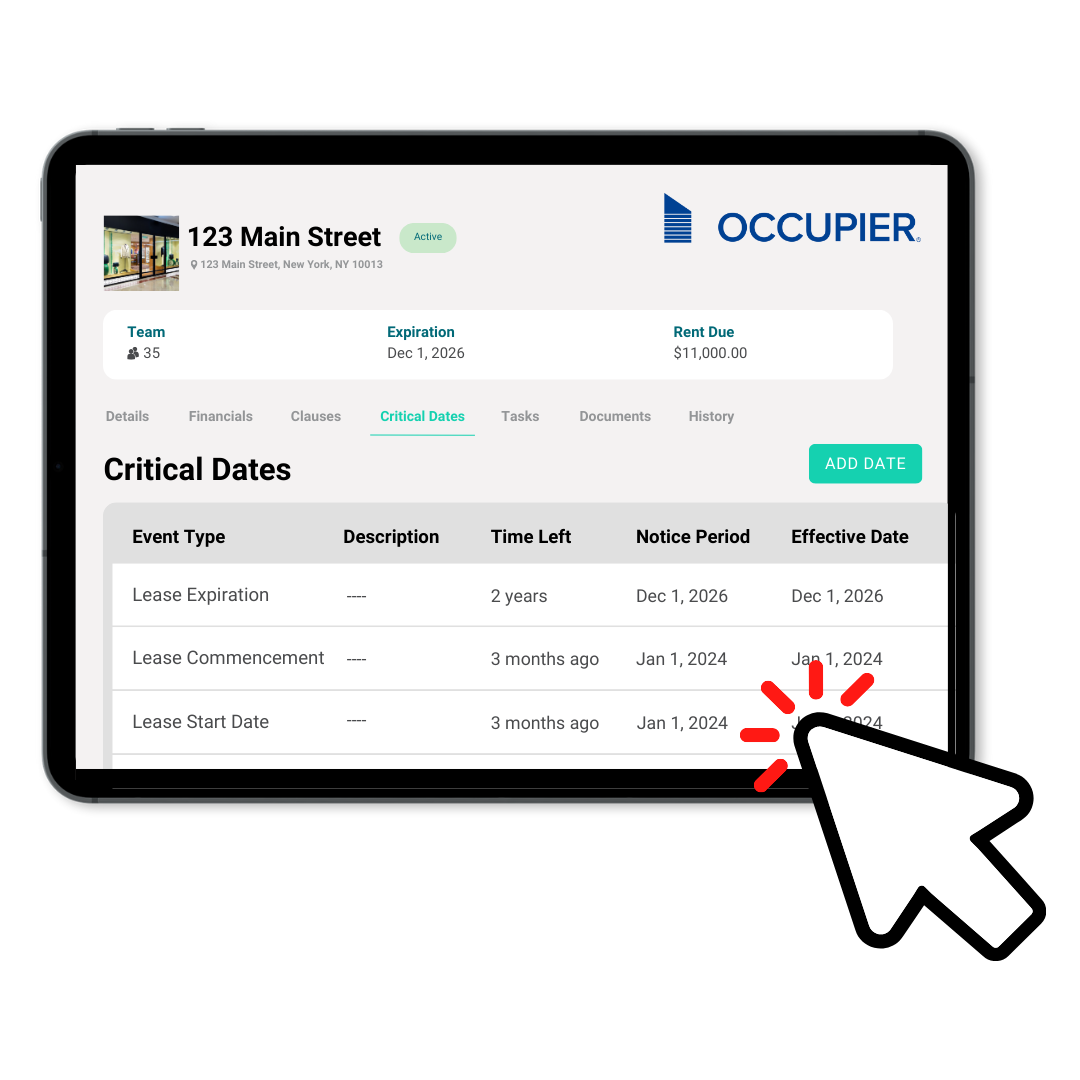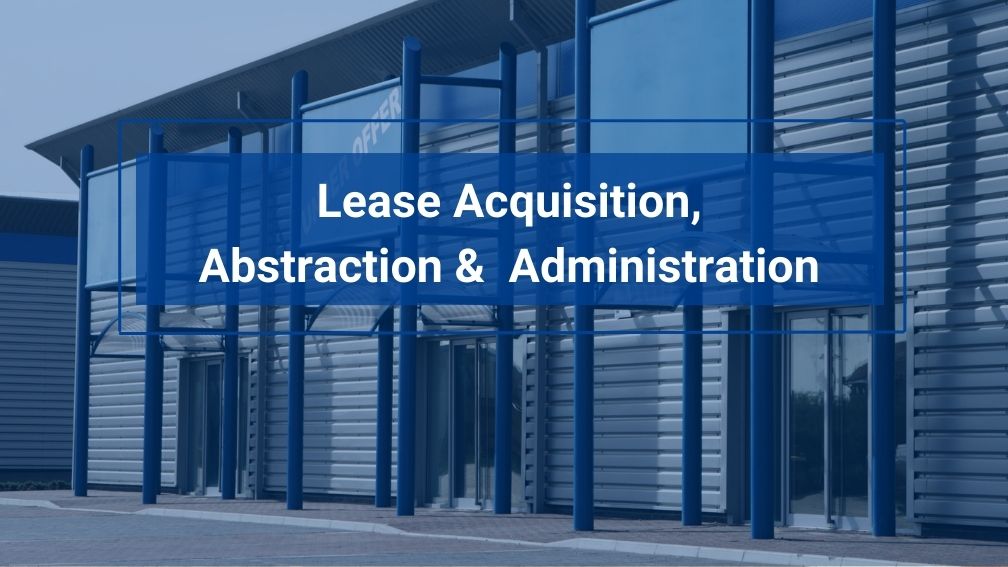Commercial Real Estate: Lease Acquisition, Abstraction & Administration
Last Updated on July 24, 2025 by
Commercial lease acquisition, lease abstraction, and lease administration — are three crucial pillars that underpin successful ventures in the commercial property sector. According to Forbes, 61% of commercial real estate teams admit “their firms’ core technology infrastructures still rely on legacy systems, but nearly half are making efforts to modernize.”
So whether you’re an emerging brand looking to expand your portfolio or an established commercial tenant re-invigorating your commercial real estate strategy, understanding these three fundamentals is key. In this blog post, we will delve into the nuances of lease acquisition, abstraction processes, and the essential aspects of effective lease administration.
Lease Acquisition: Property Expansion
Lease acquisition is a common strategy for retail property brands, franchises, and restaurateurs focused on growth, typically when one company acquires another or when two organizations merge. Through this process, the acquiring business often assumes control of the real estate leases and accompanying lease payments.
These legal documents hold essential information that requires careful analysis. The lease acquisition process involves understanding the existing rent provisions, lease dates, renewal periods, and property address details, each of which can affect your future cash flow and operational flexibility.
An effective lease acquisition strategy includes:
Identifying Your Needs
Start by identifying your specific needs, such as square footage, property location, accessibility, budget, and customer demographics. For example, if you’re acquiring a company, assess their lease contracts, current lease accounting practices, and how their property information fits into your broader real estate portfolio. Understanding the scope of their rent rolls and operating costs will help you determine if they’re a cost-effective option.
Due Diligence
During due diligence, the acquiring company thoroughly reviews the target company’s lease contracts and associated legal documents. This includes evaluating base rents, percentage rent clauses, option rents, property taxes, exclusive use clauses, and other key data points. Legal counsel or a lease abstraction company can support data validation and provide the necessary legal services to ensure accurate data across the entire portfolio.
Negotiation and Renegotiation
In many cases, lease negotiation is required to align legacy agreements with current goals. This may include adjusting base rents, modifying exclusive use clauses, or updating rent provisions. Clear communication with property managers and property management companies ensures that renegotiations reflect the new structure of your real estate strategy.
Lease Acquisition
Once the acquisition is complete, the acquiring company inherits the leases and assumes responsibility for future rents, lease payments, and property obligations. A Project Manager should oversee the transition of lease data, ensuring current data is accurately transferred into lease administration systems for seamless integration.
Lease Abstraction: Data Accuracy
Lease abstraction is the process of summarizing complex legal documents into simple terms, capturing only the most relevant information. It extracts key lease data points, like lease dates, square footage, Security Deposit amounts, rent provisions, and maintenance costs, into a centralized, searchable format.
Many companies now leverage Lease Administration Software and AI-Lease Abstraction Solutions to streamline this critical step in their lease management workflows.
So, why is lease abstraction a non-negotiable part of the overall process?
Streamlined Lease Management
Abstracting lease data into a digital system gives real estate teams, finance departments, and Legal Counsel quick access to critical information. It also supports better data input practices, helping avoid errors and late fees that stem from missing essential tasks.
Efficient Decision-Making
Lease abstracts consolidate essential information, allowing teams to assess key terms and renewal periods without combing through entire contracts. This makes it easier to compare lease obligations across a property portfolio, supporting faster and more informed decisions.
Compliance and Risk Management
With software-based lease abstraction, companies can better monitor lease compliance. This includes tracking insurance obligations, exclusive use clauses, operating costs, and rent escalations—ensuring that no detail falls through the cracks.
Collaboration and Communication
Abstracts present relevant information in a user-friendly format, improving communication among tenants, accounting teams, legal advisors, and property managers. A standardized lease abstract template makes it easy to share, interpret, and act on critical data.
Scalability and Growth
As companies acquire more locations, abstracting leases becomes vital for integrating new properties into their system. Automated lease abstraction ensures consistency across your entire portfolio, whether you’re managing a single property or scaling rapidly across multiple markets.
In summary, lease abstraction supports lease accounting, data integrity, and Report generation. Whether handled in-house or outsourced, abstracting leases into structured formats ensures accuracy, enables actionable insights, and empowers your team to make better decisions.
Lease Administration: Ensuring Efficiency
Lease administration involves managing the lifecycle of your lease agreements, from rent payments to compliance tracking to critical date monitoring. This essential function enables companies to keep their commercial real estate operations efficient, compliant, and future-ready.
As your property portfolio grows through acquisitions or expansion, managing the volume of lease data becomes increasingly complex. Efficient lease administration requires more than manual spreadsheets or outdated systems. Let’s explore the challenges and how software and abstraction tools can solve them.
Volume and complexity
Managing a significant volume of commercial leases, each with unique terms, square footage, property taxes, and rent schedules, is a resource-intensive task. Centralizing lease data using software abstraction tools helps reduce human error and increases operational accuracy.
Tracking Key Dates and Obligations
Missing lease dates, renewal periods, or option rents can be costly. Lease administration software helps automate alerts for future rents, CPI increases, or Security Deposit refunds, minimizing risk and maintaining compliance.
Standardization and Consistency
Different lease agreements use varying language and formats. Lease abstraction standardizes data across contracts, capturing the necessary information in a consistent format. This ensures that your reporting, rent rolls, and compliance efforts remain reliable and scalable.
Efficiency and Time Savings
Manual lease administration requires intensive data input and coordination. Software-powered lease systems automate essential tasks like rent calculation, document management, and data validation, freeing up your team to focus on value-added work.
Enhanced Collaboration & Accessibility
Collaboration is essential across internal teams, legal services, property managers, and external vendors. A cloud-based lease administration platform ensures that everyone has access to the current data, lease abstract template, and relevant communication history. This transparency improves the landlord-tenant relationship and accelerates project timelines.
Power Your Real Estate Strategy with Occupier
Lease acquisition, lease abstraction, and lease administration form the backbone of strategic portfolio management for commercial tenants. Whether you’re navigating mergers, expanding into new markets, or streamlining operations across your existing real estate portfolio, mastering these pillars is essential.
By partnering with a trusted lease abstraction company and using purpose-built lease management software, you can unlock the full potential of your property information. Occupier supports commercial tenants with software abstraction, automated lease abstraction, and customizable tools for managing rent rolls, legal documents, and lease accounting requirements.
Explore our lease abstract template, learn how to integrate your leases into one system, and see how our platform powers better decisions across your entire portfolio.

Product Tour
Take a self-guided tour and see how the fastest-growing commercial tenants leverage Occupier for lease management & lease accounting.


